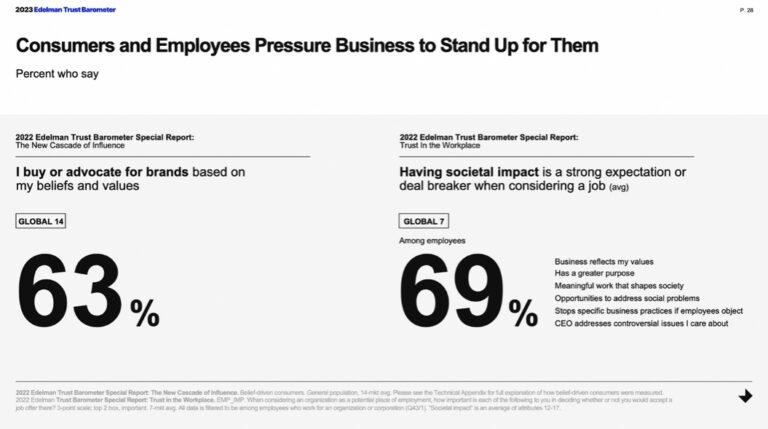For the first time in its 25-plus year history, the Edelman Public Trust Barometer found that nonprofits were no longer the most trusted institution – business is.
What does this mean for the nonprofit sector, and how should its leaders mobilize to secure the confidence of the public in the sector’s purpose and impact?
Background
The bottom line is that trust matters when it comes to support for nonprofit organizations. Trust is at the root of nonprofits’ relationship with the public and core to our missions. Trust, therefore, deserves far greater consideration – and more intentional consideration – than it typically gets.
And if nonprofit leaders can build broader social trust, beyond our own organizations, our impact on human well-being will only escalate.
Sadly, there is a rising tide of distrust in the U.S. and globally. According to the 2023 Edelman Trust Barometer, nearly 6 in 10 people across 24 countries say their default tendency is to distrust until they see evidence to the contrary. Another 64 percent say they are so distrustful that they are incapable of having constructive and civil debates about issues they disagree on.
Distrust has a price – and all of us are paying it.
Studies show that when levels of distrust are elevated, cooperation is harder. The cost of ensuring people comply with laws, regulations, and contractual agreements go up. Markets and public institutions work less efficiently. And nonprofits, by necessity, become less effective. Consider the fact that only 30 percent of those polled would help someone who they strongly disagreed with if that person was in need.
So where can society turn for leadership in solving societal problems in such a distrustful time? For the first time, the greatest percentage of people (62%) say that business can be best trusted to execute plans and strategies that yield results. In contrast, 59 percent say nonprofits can be trusted to do so.
What is the cause of the decline in trust among nonprofits?
In short, the factor fueling the decline in public trust is the perception of nonprofits’ capacity to make an impact. Trust comes primarily from delivering results competently and demonstrating integrity and care for others. If 41 percent don’t trust nonprofits, they are likely seen as falling short in one of those two areas.
▼ Edelman Trust Barometer: Global competence and net ethical scores, 2020-2023

The good news: Nonprofits are still seen as a strong force for good.
Edelman’s Trust Barometer indicates that 46 percent of respondents see nonprofits as a unifying force.
Additionally, a recent report on trust in civil society by Independent Sector found that 84 percent of respondents said that they were confident in the ability of nonprofits to strengthen American society and saw nonprofits’ primary role as helping the less fortunate, making change, and leading by example. As the Edelman report emphasizes, trust is now built locally, and these three factors form an instructive template for nonprofits to use in building trust with the public.
The challenge for nonprofits is to change public perception of the sector – from one that is lacking in capacity to one that can be trusted to make positive change happen.
The fact is that the sector is comprised of a vast array of small local organizations. This means that nonprofit leaders need to band together to articulate the sector’s collective power, including our local impact in aggregate; our historical innovations; our collective economic position as the nations 4th largest employer; and our role as unifiers. Leaders should formulate local and national strategies to message these strengths and galvanize the public’s understanding of the sector as a unifying force for equity, justice, and personal security.
▼ Edelman Trust Barometer: Global dividing vs. unifying scores

The Nonprofit Opportunity
Nonprofits must lead. Nonprofits are seen as unifiers, and we are trusted. This is an advantage that we can leverage by communicating factual, science- and data-backed information; by delivering solutions and promoting their impact locally; by closing equity gaps; and by providing a sense of focus, care, and urgency around the issues that are provoking the most anxiety and polarization. In paticular, we need to give people a reason to answer “yes” to the question, Will I and my family be better off?
What tangible actions can nonprofit leaders take?
Regarding public perceptions of nonprofit capacity, leaders can:
- Harness technology and outsourcing opportunities to leverage resources and drive greater impact.
- Communicate with the public about your actual capacity and the innovative solutions you’ve developed.
- Combine your capabilities with other organizations to make your impact visible and tangible for local communities.
- Promote equitable practices and shift any perceptions of low opportunity within your own walls.
Nonprofits must collaborate more, and far more intricately, than ever before. People understand that the biggest issues of the day – like equity, climate change, and political polarity – are so big that no one entity can succeed alone. They know that better results come from working together.
Nonprofits can partner with business to leverage their capacity and innovation skills, and with government to lend credibility to solution-building efforts. To reinforce this, nonprofits need to move beyond funding requests: We must engage business and government in solving problems cooperatively in order to restore public confidence in our ability to make impact
▼ Edelman Trust Barometer: Trust in collaboration for social good by country

Nonprofits need to demonstrate equity and fairness – not just advocate for it. A huge part of societal polarization is the growing gap in economic well-being. Nonprofits cannot engender trust if we are seen as a part of the problem. Nonprofits should demonstrate equity by ensuring fair compensation, investing in employee training for the jobs of tomorrow, and being open and explicit when ensuring that unbiased opportunity exists within our own walls.
Nonprofits should see a core role for themselves in disseminating factual information – a role that should be both highly vocal and highly visible. Leaders, boards, and nonprofit coalitions should create strategies to become a source of reliable information: actively speaking out, promoting data-backed messages, and working to de-politicize the information we provide.
▼ Edelman Trust Barometer: The effect of value alignment and social impact

Finally, we must recognize that process matters. How we engage – not just with whom and around which issues – matters enormously in building trust. Deep listening and respect must be paramount because deeper levels of engagement lead to deeper levels of trust. According to the Independent Sector report referenced above, those who regularly receive services from nonprofits report higher-than-average trust scores: In fact, 42 percent say their interactions with the organization improved their impression of nonprofits generally. This reinforces the idea that trust is won locally, in everyday interactions with constituents, board, volunteers, and staff.
Resources for Further Learning
- 2023 Edelman Trust Barometer Global Report / Edelman
- Richard Edelman on the 2023 Trust Barometer Findings (3 minute overview) / Edelman
- 2023 Trust Barometer: A Conversation with Richard Edelman (46 minutes) / Atlantic Council
- Why Trust Matters More Than Ever: Exploring Edelman's Trust Barometer 2023 (11 minutes) / Socially Constructed Online
- Rebuilding Trust: What It Will Take / Edelman
- Building Trust at Work / Edelman
Find out about all the latest sector developments with the rest of our Nonprofit Trends Resource Hub
